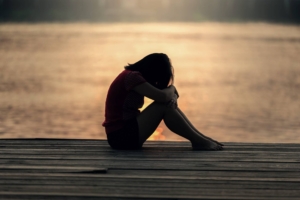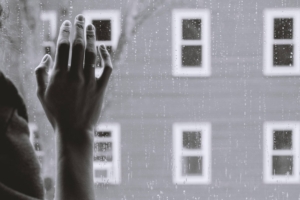Everyone will experience the loss of a loved one. However, there are also times when people experience a different loss that others do not acknowledge as a loss. Whether or not others understand, losing someone or something important is real. The grief related to this type of loss is termed disenfranchised grief. When a person has been deprived of the right to grieve, they have been disenfranchised.
 Disenfranchised grief is not the same as complicated grief. Over time, grief has most commonly been associated with death. Complicated grief is the intensity of grief that will interfere with a person’s ability to function and adapt to the loss. Disenfranchised grief is experienced when a person grieves for something or someone that others do not acknowledge.
Disenfranchised grief is not the same as complicated grief. Over time, grief has most commonly been associated with death. Complicated grief is the intensity of grief that will interfere with a person’s ability to function and adapt to the loss. Disenfranchised grief is experienced when a person grieves for something or someone that others do not acknowledge.
The Lord is near to the brokenhearted and saves the crushed in spirit. – Psalm 34:18, ESV
Those who are struggling with disenfranchised grief may feel shame and isolation because they are unable to grieve openly. This can cause a person to mourn without having the support system they need to process the heartache.
What causes disenfranchised grief?
When those around them do not acknowledge someone’s loss, they experience disenfranchised grief. They don’t have any validation for their heartache because they cannot openly grieve. There is not one specific type of loss that falls into this category of disenfranchised grief.
A few of the more common situations that can cause disenfranchised grief are:
- Loss of a pet.
- Loss of a job.
- Loss of a close friendship.
- Loss as a result of suicide.
- Loss of health, such as stroke or dementia.
- Loss of business relationship.
- Loss due to someone leaving school, work, or church.
- Loss of a home.
- Infertility struggles.
- Loss of relationship with an abusive partner.
- Loss of an LGBTQ friend/partner.
- Loss of teacher, coach, peer.
- Loss of patient or client.
- Loss of independence.
- Loss of safety.
- Loss due to substance abuse.
- Loss of an incarcerated person.
- Loss of miscarriage or stillborn.
Some of these examples are not related to the death of a person, yet they impact the person grieving in the same way. That is why we have a promise from God that He will comfort those who mourn. It doesn’t matter if it’s a pet, friend, home, or spouse; the hurt is still hurt, and it still affects us physically and mentally.
What are the common types of disenfranchised grief?
The type of loss depends on what or who was lost. It could be a material item, a person, or a lifestyle. Most of the common losses can be labeled in one of five categories:
 “Insignificant” Loss: This loss refers to one that is not socially accepted or is not someone directly related to the person grieving. A common example is celebrity deaths. This can also be said of someone who loses a friend compared to another who has lost a mother or daughter. There are examples of non-death losses for this category as well. The loss of a family heirloom or childhood item can also be considered insignificant by others.
“Insignificant” Loss: This loss refers to one that is not socially accepted or is not someone directly related to the person grieving. A common example is celebrity deaths. This can also be said of someone who loses a friend compared to another who has lost a mother or daughter. There are examples of non-death losses for this category as well. The loss of a family heirloom or childhood item can also be considered insignificant by others.
Stigmatized Loss: A stigmatized loss is typically related to a loss that is not normally acknowledged or supported by others. These are losses such as stillbirth, death due to addiction, death by suicide, or miscarriage.
Non-Death Loss: A non-death loss can be grieved just the same as a close relative. The pain can be the same. Just because these losses aren’t typical and not experienced by everyone doesn’t mean they are invalid. Few outlets allow for the mourning of marriages, friendships, estranged families, and people who have left school, work, or church.
Unrecognized relationship loss: Some relationships are not given the weight that socially accepted relationships are given. These types of relationships are those between same-sex partners, partners from infidelity, and those who are in abusive relationships.
Disenfranchised people who experience loss: Some people are assumed to be unable to grieve for various reasons. Children are among the top few in this type of disenfranchised grief. Others are those with cognitive or developmental disabilities. This can also refer to those who have been grieving for a long period and those who show no signs of grieving.
Each type of disenfranchised grief can affect a person’s mental health. When a person feels as though their grief is invalid, they will often struggle with shame, guilt, and anger on top of feeling the normal grief related to a loss. To properly process grief, it needs to be validated and supported.
Treating and Coping with Disenfranchised Grief
When grief is unique, there is a need for a unique way of coping with it. If it is disenfranchised grief, the person will need to give themselves permission to mourn and grieve in a way that works for them.
Acknowledging the loss
Whether anyone else acknowledges the loss, it is okay for the person to voice and declare the loss they have experienced. This can help them validate the hurt and other emotions that come with loss.
 Feel the feelings
Feel the feelings
Grief is hard in any form. When a person feels as if they are alone in that grief, all the emotions seem more intense. There is no straight pathway for grief; it will be wound with all kinds of emotions. It is vital to remember that feelings and emotions won’t always make sense. But it is okay to feel the feelings and express them in the best way.
Create a ritual
Grief rituals play an important role in the grieving process. They allow for acknowledgment and acceptance of the loss. For those with disenfranchised grief, having a private ritual can ease the pain of walking through a loss when others don’t validate the heartache.
Some examples of rituals are:
- Light candles.
- Write a letter and bury it.
- Create something that represents the loss.
- Carry a small item that reminds you that the loss is valid to you.
- Visit a meaningful place that is associated with the loss.
- Hold a memorial service with or without others.
- Engage in material relevant to the loss.
When a loss isn’t validated as a reason for a person to grieve, a person can feel alone and isolated if a person can engage in material such as podcasts, documentaries, and blogs to validate the grief process. The person can stop engaging when it feels like the material is no longer helpful.
Practice self-care
Grief can affect a person physically and mentally, just as it does emotionally. Self-care, which includes sleeping, eating, and mild exercise, is vital for keeping the body and mind healthy.
Try journaling
Journaling the process of grief can be a tremendous help in healing. It allows for sharing thoughts and feelings about the loss even when others do not acknowledge it. There are several ways to journal, but the simplest form is free-writing whatever is on one’s heart and mind.
Reaching out
Processing grief takes support. When a person is struggling with disenfranchised grief, it is vital to have a support network. This can be friends, family, and counselors. There may be a support group for the specific type of loss that would create a sense of belonging.
 Grief is always a challenging time. It is difficult, and there are no answers to the questions that come with a loss. Disenfranchised grief brings with it different challenges. People who feel as though their loss is being ridiculed, invalidated, and dismissed often find themselves struggling with isolation issues during a time when they need support the most.
Grief is always a challenging time. It is difficult, and there are no answers to the questions that come with a loss. Disenfranchised grief brings with it different challenges. People who feel as though their loss is being ridiculed, invalidated, and dismissed often find themselves struggling with isolation issues during a time when they need support the most.
If you are experiencing disenfranchised grief, reach out to our office today. The counselors at our location can help you navigate this process and help you find the support you need as you grieve your loss.
https://psychcentral.com/health/disenfranchised-grief#causes
https://www.choosingtherapy.com/disenfranchised-grief/
https://www.psychologytoday.com/us/blog/grief-and-the-replacement-child/202110/disenfranchised-losses-when-grief-goes-underground
https://www.verywellmind.com/disenfranchised-grief-definition-causes-impact-and-coping-5221901
https://www.psychologytoday.com/us/blog/lifetime-connections/202103/disenfranchised-grief-mourning-events-never-were
“Sad”, Courtesy of Pixabay, Pexels.com, CC0 License; “Raining again…”, Courtesy of Kristina Tripkovic, Unsplash.com, CC0 License; “Cannery Row”, Courtesy of Paolo Nicolello, Unsplash.com, CC0 License; “Flowers at Sunset”, Courtesy of Irina Iriser, Unsplash.com, CC0 License









